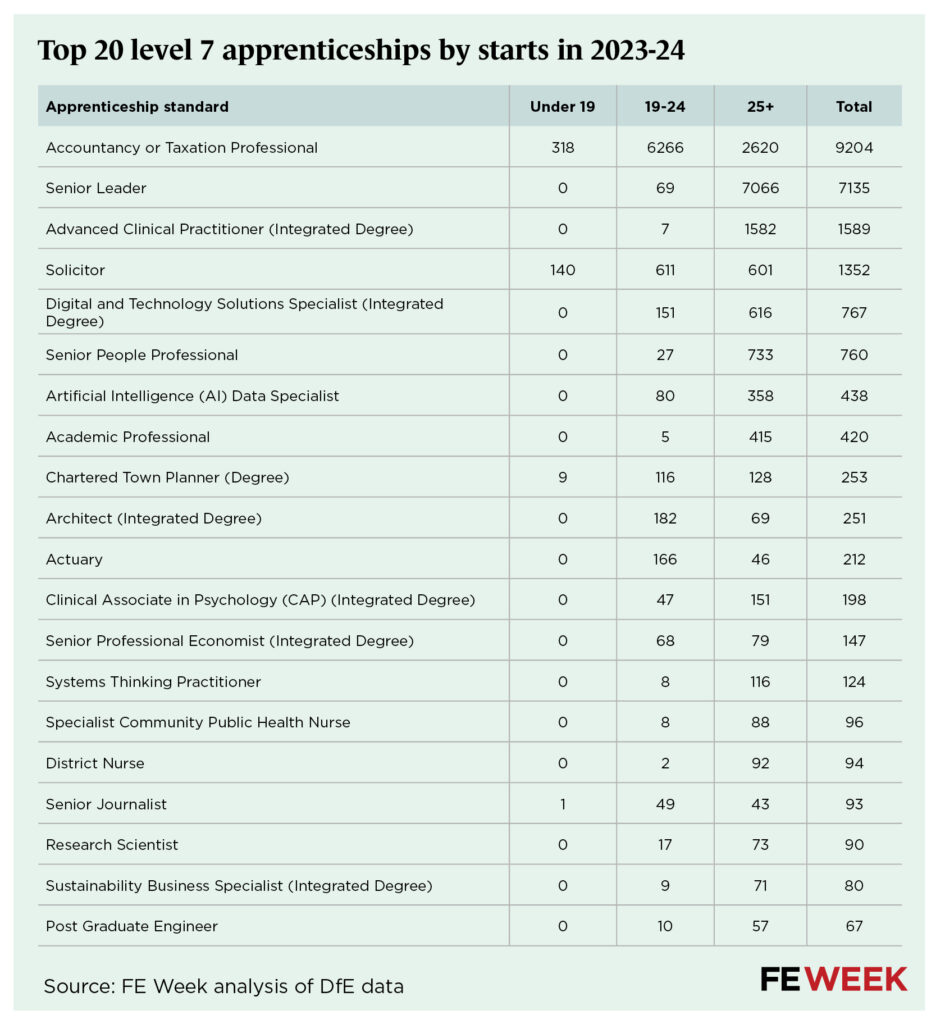Bridget Phillipson has been accused of “political posturing” with a “daft” concession on level 7 apprenticeships that exempts a tiny number of 16 to 21 year olds from having their funding axed.
In a leaked letter to Cabinet Office minister Pat McFadden last month, seen by FE Week, Phillipson said she hoped retaining level 7 funding for under-21s would mean “colleagues” could drop their opposition to her original plans to remove the funding from all master’s level apprenticeships.
But experts hit out at the “ridiculous” move, which they predict will still lead to a widespread wipeout of level 7 apprenticeships, with public services such as the NHS and councils braced to bear the brunt.
The government only publishes data on apprenticeship starts in three age groups: under-19s, 19 to 24 year olds, and 25-plus.
FE Week analysis for the most recent full academic year, 2023-24, shows of 23,860 level 7 starts, of which 468, or 2 per cent, were for under-19s, while 7,995, or 34 per cent, were people aged 19 to 24.
Most providers and universities that spoke to FE Week this week said less than 10 per cent of their annual level 7 starts are for those aged 21 or under.
The Department for Education refused to provide a full age breakdown.
Mandy Crawford-Lee, chief executive of the University Vocational Awards Council described the 16 to 21 age restriction as “ridiculous… daft and somewhat disingenuous”, adding that the decision “is driven by political posturing and positioning” (click here to read full op-ed).
The backlash comes during a difficult week for Phillipson, who again appeared in multiple news reports over the weekend as being tipped for demotion in an upcoming reshuffle.
Shadow skills minister Neil O’Brien said: “Abolishing level 7 across the board, with a tiny exception for young people, will be a disaster. It will blow a hole in the NHS long-term plan which relies on this route for advanced nurses. It will hit other public services and local government and it will shut down a vital route into the professions for less well-off people who don’t have the money to fund their own professional qualifications.
“The letter leaked to FE Week shows, unbelievably, that other departments are doing more to defend education than the Department for Education is. This will be a shameful legacy for Phillipson.”
Fears for future of level 6 follow level 7 precedent
The education secretary’s letter revealed she sought clearance from the Cabinet Office on March 3 “on the decision to remove public funding from all level 7 apprenticeships, with no exemptions”.
FE Week understands that multiple government departments objected and forced Phillipson into a rethink.
The 21-and-under age limit, which chimes with the government’s youth guarantee, “aligns with our opportunity mission and our intention to rebalance the apprenticeship programme to support more young people at the start of their career”, the letter said.
It added that “while not giving employers everything they seek”, this “important concession… demonstrates that government has listened to business”.
Former Conservative skills minister Robert Halfon said the exemption was a “baby step in the right direction” but added this was “not a level-headed way of doing things”, and advised the education secretary to make concessions for different sectors instead of age.
He told FE Week he also feared “overreach” from the precedent that will be set when level 7 apprenticeships are moved outside the scope of levy funding, as this could pave the way for axing level 6 apprenticeships, which would be “absolutely disastrous”.
Accountants and solicitors least affected
Apprenticeships least affected by the new age cap are the accountant and solicitor standards.
FE Week analysis shows that the “accountancy or taxation professional”, which has become the most popular level 7 apprenticeship standard with 9,204 starts in 2023-24 and attracts a £14,000 funding band, had 3 per cent of participants under 19, while 68 per cent were aged 19 to 24.
FE Week understands the proportion of level 7 accountancy starts for those aged 21 or under varies for providers from 10 to 25 per cent.
Maggie McGhee, executive director, strategy and governance at the Association of Chartered Certified Accountants (ACCA) said she was “concerned that changing the funding rules to restrict funding to learners 21 and under would create perverse incentives for employers to change recruitment patterns”.
Alan Vallance, chief executive of the Institute of Chartered Accountants in England and Wales (ICAEW), said his organisation “supports the idea of an age concession” but that the range of 16 to 21 “may not be appropriate”.
“Our position remains that an age exemption of 18-25 would be an effective compromise that supports the government’s wider objective for economic growth,” he said.
Elsewhere, the solicitor apprenticeship, which attracts the maximum funding band of £27,000, had 1,352 starts in 2023-24. Of those, 10 per cent were under 19 while 45 per cent were aged 20 to 24.
Meanwhile, 0.4 per cent of the 1,589 starts on the level 7 advanced clinical practitioner apprenticeship used mainly by the NHS were for those aged under 25. The district nurse standard had 2 per cent of 94 starts at 24 or below.
The senior leader level 7 apprenticeship, which the Chartered Management Institute claims is largely taken by professionals in the NHS, education and civil service, has less than 1 per cent of starts for those aged under 25.
Other popular level 7 apprenticeships likely to become unviable to due to a 21 age limit include senior people professional, digital and technology solutions specialist, chartered town planner, artificial intelligence (AI) and architects.
Vanessa Wilson, University Alliance CEO, said: “If what is being reported comes to fruition, then the decision is bordering on the ridiculous. Limiting funding for the highest level of apprenticeship to an age group that typically hasn’t even finished level 6 education, most of whom wouldn’t even qualify for level 7, is hardly a concession.
“This would have serious knock-on effects, especially for vital employers like the NHS, local authorities and education, who don’t have access to additional budget to fund these qualifications outside of the apprenticeship levy.”
Former special adviser to skills ministers Tom Richmond pointed out that, considering the vast majority of level 7 apprentices are university graduates, sparing 16 to 21 year olds from the proposed cuts will “not do much to soften the impact on employers and providers”.
Experts also flagged that defunding the majority of level 7s is counterintuitive to the government’s industrial strategy, including ministers’ focus on advanced manufacturing, artificial intelligence and clean energy.

Mis-sold pathways and unviable cohorts
Dan Lally, deputy chief operating officer at Sheffield Hallam University, described the age limit as “somewhat of a non-announcement because it really doesn’t move the needle” considering the small numbers of 21-and-under level 7 apprentices.
He said the policy “pulls the drawbridge” on the concept of apprenticeship standards being designed to provide a linear pathway for students to work their way up.
“We may have people in the system now who have always planned on progressing, and this policy just takes that opportunity away from them. So you have got to think, have we mis-sold to young people?” Lally said.
He added that universities need cohorts of at least 20 students to be viable – a number most are unlikely to be able to achieve with just 16 to 21 year olds.
Other large level 7 providers, like Kaplan and Cranfield University, agreed that the age exemption will have “little impact”.
The University of Sunderland added that even if it did attract apprentices for these programmes in the 16 to 21 age group, it is “highly unlikely there would be sufficient to enable the cohort to be viable both financially and in terms of the other academic and pastoral support required”.
Employers and providers also criticised the DfE for not communicating the concession with the sector, and for failing to say when any defunding would kick in.
The DfE declined to comment.
















Your thoughts